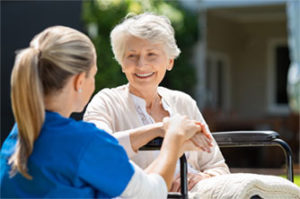During the winter months, ice, snow and cold temperatures can make life
challenging for everyone. Slippery sidewalks and cold weather can cause a wide
range of injuries and illnesses – especially for seniors. Here are some tips for
preventing common winter dangers that seniors may face.
- Listen to weather reports regularly and take note of bad weather on the horizon.
Preparation is the key to a safe winter. - Prepare for power outages. Winter storms can lead to power outages. Make
sure you have easy access to flashlights and a battery-powered radio so you can
still listen to the weather news during a storm. Always have extra batteries on
hand. - Stock up on fresh water and dried or canned food (make sure you have a
working can opener). If you have pets, stock up on their food, too. - Have at least a seven-day supply of your medications with you. If you use
oxygen, have an emergency supply to last three days or more. - If you have a caregiver, make sure there is an emergency plan in place in case
weather prevents your caregiver from getting to you. - Set up a buddy system with a neighbor who will check in on you in case of a
storm. Let someone know where you are going and when you will return.
Always take a fully charged cell phone with you when you are driving. - If you drive, winterize your car by checking antifreeze levels, tire tread and
pressure, and windshield wipers. Stock your car with basic emergency supplies. - Keep walkways and steps around your home clear of debris to help prevent
slips and falls. - Use salt and sand on driveways and sidewalks to melt snow/ice and improve
traction. Make sure to shovel your driveways often or have someone in place
to do this for you. - Cold temperatures can lead to frostbite and hypothermia. If you must go
outside in cold weather wear warm socks, a heavy coat, a warm hat, gloves and
a scarf. In very cold temperatures cover all exposed skin. Use a scarf to cover
your mouth and protect your lungs.


